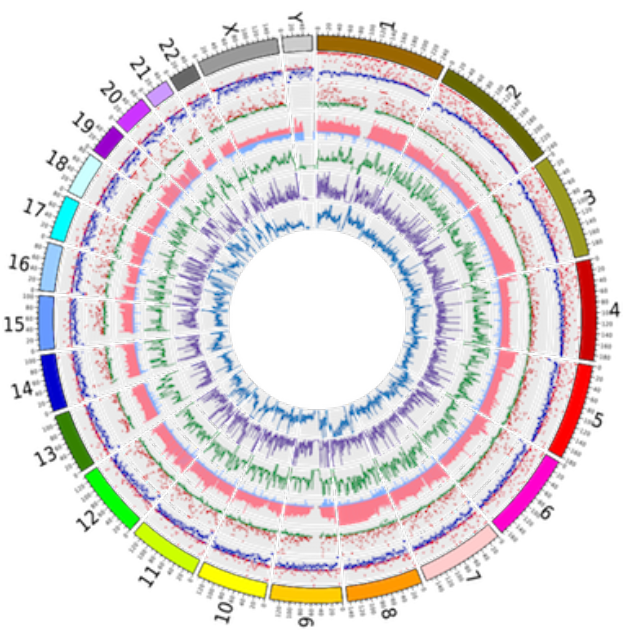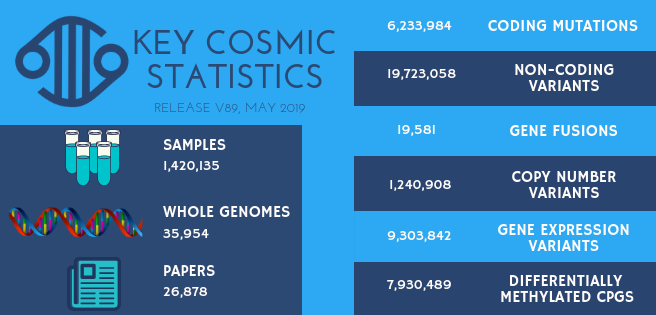
COSMIC Release v89
15 May 2019
COSMIC v89 (May 2019) has just been released! In this release we have 4 newly expert-curated genes: DDX3X, LATS1, PIK3CB and NCOR2; and a significant update to bile duct cancer (cholangiocarcinoma). We've also incorporated 231 whole genome screened samples from 10 systematic screen papers.
We have a major expansion to the mutational signatures. Version 3 characterises 49 single base substitution, 11 doublet base substitution, four clustered base substitution, and 17 small insertion and deletion mutational signatures. Full details of which are available on our blog.

New genes: DDX3X (DEAD-box helicase 3 X-linked) encodes a member of the large DEAD-box protein family which has ATP-dependent RNA helicase activity and RNA-independent ATPase activity. The protein has multiple conserved domains and plays roles in both the nucleus and cytoplasm. Recurrent mutations in DDX3X, a tumour suppressor gene, are found in medulloblastoma, where the WNT-subgroup is enriched for these mutations, with missense mutations clustering in the DEAD-box helicase domain. In chronic lymphocytic lymphoma inactivating DDX3X mutations are also detected, especially in cases with unfavourable clinical markers. Next-generation sequencing studies have shown a high frequency of truncating and missense DDX3X mutations in extranodal natural killer/T cell lymphoma, where most of the mutations affect the two highly conserved domains: the ATP-binding helicase domain and the C-terminal helicase domain. Mutations are also present in the closely related aggressive natural killer-cell leukaemia as well as in a small subset of pleural and peritoneal mesothelioma, and in human papillomavirus-positive oral squamous cell carcinoma.
LATS1 (large tumour suppressor kinase 1), found at the genomic locus 6q25.1, encodes for a serine/threonine kinase which acts in the Hippo signalling pathway via YAP/TAZ proteins by restricting proliferation and promoting apoptosis. Genomic alterations in Hippo pathway components have been found in many tumour types. These include malignant mesothelioma, where LATS1 fusion genes and deletions can result in inactivation of its tumour suppressor function, and ER+ breast cancer, where these alterations have also been found to promote cyclin dependent kinase 4/6 inhibitor resistance. Abnormal Hippo signalling pathway is involved in the pathogenesis of most sporadic schwannomas. Oh et al. (COSP46088) found LATS1 mutations in 2% of schwannoma cases and LATS1 promoter methylation in 17% of the cases. In COSMIC the expert curated mutations are primarily annotated on our canonical transcripts but for this gene they have been temporarily annotated across two transcripts, LATS1 (GRCh37 only) and LATS1_ENST00000543571 (GRCh37 and GRCh38).
PIK3CB encodes the p110β isoform of the catalytic subunit of the class I phosphoinositide 3-kinases (PI3Ks). PI3K signalling pathway has been shown to be important across cancer, with another class I catalytic subunit isoform, PIK3CA, already well-established as a key gene and drug target in many different cancers. PIK3CB mutations are seen far less frequently than those in PIK3CA, but there is now growing evidence that PIK3CB also plays a significant role, in particular in PTEN-deficient tumours, with mutations in the kinase domain (D1067, E1051) having been shown to have oncogenic potential. These mutations are seen at low levels in a wide range of cancers, including large intestine, skin, lung, endometrium and prostate.
NCOR2 (nuclear receptor corepressor 2), also called SMRT, mediates the transcriptional repression activity of some nuclear receptors by promoting chromatin condensation. NCOR2 has been shown to repress androgen receptor activity thus providing a rationale for the role of NCOR2 inactivating mutations in prostate cancer initiation and progression. NCOR2 acts as a haploinsufficient tumour suppressor gene. It is known to be involved in several repression pathways; therefore, its down-regulation can potentially activate numerous downstream genes that are normally repressed. Accordingly, NCOR2 mutations have been observed in many cancer types such as colorectal, gastric and breast cancers, non-Hodgkin and marginal zone lymphomas and acute lymphoblastic leukaemia. In COSMIC the expert curated mutations are primarily annotated on our canonical transcripts but for this gene they have been temporarily annotated across two transcripts, NCOR2 and NCOR2_ENST00000405201.
As part of release v89 we have focused on updating the expert-curated mutation data for bile duct cancer (cholangiocarcinoma). Approximately 60 additional publications that include mutation screening data in this disease are included in the release. Bile duct cancer (BDC) is the second most common adult primary liver cancer and is classified as intrahepatic, perihilar or distal extrahepatic based on the predominant location. Each subtype has a distinct epidemiology, biology, prognosis and disease management protocol. Worldwide the incidence of intrahepatic BDC is increasing and its prognosis is very poor. For this release we have curated publications reporting molecular signatures in BDC, including rarer variants, and studies highlighting potential actionable targets, full details of this are available on our blog.
For further technical details please see the release notes.
